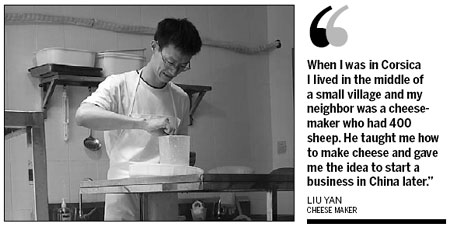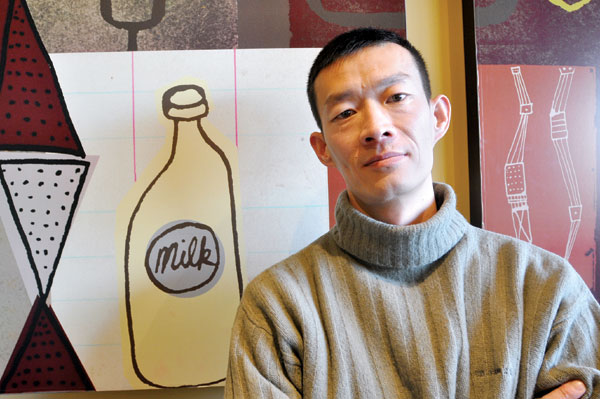The big cheese
Updated: 2011-12-11 07:50
By Mark Graham (China Daily)
|
|||||||||
|
Liu Yan's first cheese experience was at college. "There were 20 different kinds of cheese served with French wine. It was very smelly, but I liked it a lot," he says. Mark Graham / for China Daily |

Chinese pioneer finds that French-style curds please expat palates, Mark Graham reports.
Finding fresh, French-style cheese in Beijing was a difficult mission until Liu Yan set up his grandly named business, Le Fromager de Pekin, which concentrates on making the soft, pungent-smelling varieties that are so popular in Europe.
Until French-trained Liu came along, people who had a hankering for fresh fromage - mostly expatriates, or Chinese who have lived overseas - had to pay inflated supermarket or deli prices for a product that might have lingered on the shelves too long. The other option was to order the cheeseboard selection at a posh hotel restaurant - an expensive exercise.
Liu began on a small scale, producing brie and camembert-style cheeses, initially at his home and, later, at a factory in the suburbs of the capital city. Reaction was favorable, so much so that Liu began experimenting with other varieties that also received approval from the city's cheese-loving gourmands.
"When I first ask people what they thought, they said it was fantastic," he recalls. "I did a menu degustation in a restaurant and there were about 50 people from different countries and I tried them with the different cheeses. I started by making four cheeses and had plenty of time to experiment with different kinds; we now have 15 choices.
"The most popular is the Beijing gris, which is similar to a camembert, I don't want to call it camembert, because it is not exactly the same, as the color and texture is different. Next, I will make a semi-hard cheese. I could easily double production if the demand is there but I don't want to grow too fast, the most important thing is to keep up the quality."
Until Liu went to study business in the Auvergne region of France a decade ago, he had not sampled real, non-processed cheese, only the bland-tasting packaged variety sold in supermarkets throughout China. Like most people tasting cheese for the first time, the smell and taste took some getting used to.
"The first proper cheese I tried was when the university had a party to welcome all the foreign students," says Liu. "There were 20 different kinds of cheeses served with French wine. It was very smelly, but I liked it a lot.
"Looking back, it was not so strong but it seemed so at the time. Later when I was in Corsica I lived in the middle of a small village and my neighbor was a cheese-maker who had 400 sheep. He taught me how to make cheese and gave me the idea to start a business in China later.
"I wanted to do something original, and thought cheese could be a good idea, so I went to a professional school to learn cheese making. The secret of it is good quality of milk and good factory conditions with good humidity: The best cheese is always made with raw milk, not pasteurized."
Back in Beijing, Liu experimented with making batches at home, which received a magnifique reaction from those most discerning of connoisseurs, the French.
A few more try-outs confirmed that Liu was indeed onto a winner, so he put together capital of 200,000 yuan (22,000 euros) to buy French-made equipment and rented a factory building. Le Fromager De Pekin was well and truly in business.
Liu's company, the Fromager de Pekin, now has orders from up-market hotels such as the Ritz-Carlton Financial Street and Hotel G, gourmet restaurants such as Maison Boulud de Pekin, Capital M and Modo, the French embassy and companies with a nucleus of French employees such as Airbus in Tianjin and Michelin in Shenyang.
In addition, the cheeses are sold in the expatriate-oriented supermarkets dotted around Beijing that sell Western food staples.
The company's core business consists of private customers, mostly in Beijing, with some in Shanghai and other cities, who order the cheese via the Internet, or call Liu directly.
As well as appreciating the quality of the products, the mostly-expatriate clients are enthusiastic supporters of an individual who has invested so much time and effort into the business; serving dinner-party guests China-made cheeses invariably produces intrigued, even astonished, reactions.
One of the most popular orders is the tasting selection, perfect for parties, or as an introduction to the wide range of cheeses that Liu offers. A large platter with eight different kinds retails for 350 yuan, with the five-variety platter going for 200 yuan.
Although sales to Chinese currently account for only a small part of the business, that is slowly changing as more and more people experiment with Western foods.
Young people in particular are traveling more and more to France and other European countries where they develop a taste for cheese, and its usual gourmet companion, wine.
There are already plenty of successful food-retail projects out there to inspire Liu. The cynics predicted that Kentucky Fried chicken would fail because China already had an oversupply of deep-fried poultry purveyors selling the dish cheaply; that Starbucks would bomb because Chinese did not drink coffee, and that Pizza Hut would fail to find a market because Chinese did not like cheese.
"Chinese people are becoming more and more interested in eating cheese," says Liu.
"In three years' time I think sales could be split 50-50 between expatriates and Chinese. It is like coffee, it has really grown in popularity during the last 10 years. In future, I will focus on Chinese customers. I think in time people will learn the cheese culture."
The ever-expanding range includes ricotta, Greek-style yoghurt cheese, as well as French style cheeses infused with herbs from Provence, olive oil, black pepper and onion.
Among the fans of Le Fromager de Pekin is Cyril Arrouard, the French executive chef of the Ritz-Carlton Financial Street, who says Liu makes "very good, fresh quality cheeses."
The surging demand leaves the affable and rangy Liu little time to pursue his twin hobbies of playing basketball, or working out in the gym. But he can see the future rewards that will result from contemporary hard work.
He adds: "I work seven days a week, normally 10 hours a day. I live close to the factory, about 10 minutes away."
In the future, he says, "I will continue to make artisan cheeses, more kinds of them. I also want to have an organic farm . . . "
You can contact the writer at sundayed@chinadaily.com.cn.












